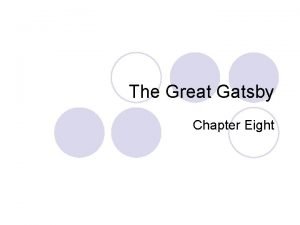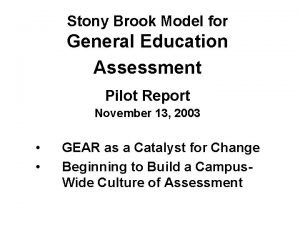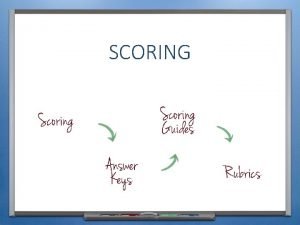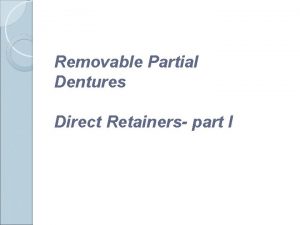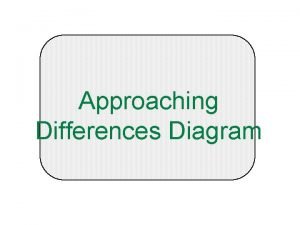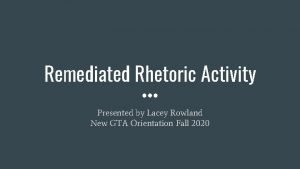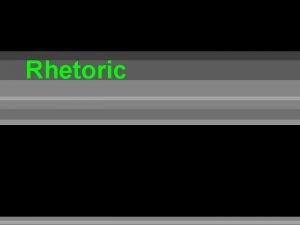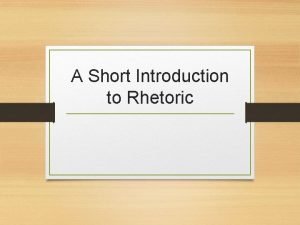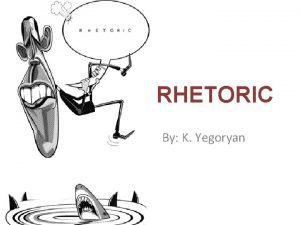APPROACHING THE REMEDIATED RHETORIC PROJECT Ashley Anderson New







- Slides: 7

APPROACHING THE REMEDIATED RHETORIC PROJECT Ashley Anderson New TA Orientation 2020

Setting Up the Remediated Rhetoric Unit ◦ This unit goes rather quickly! ◦ Prior to the start of the unit: ◦ Tell students early on in problem-solving essay that they should pick a topic that they can work with for multiple projects ◦ Can also use previous projects (literacy narrative or rhetorical analysis) ◦ Instructor can also provide a very broad topic ◦ Easier for all students to work with the same material ◦ Consider having final draft of problem-solving essay due after they present these projects ◦ Think about ways to encourage creativity with this project ◦ Avoid Power. Point, Prezi, and the traditional poster ◦ Options to use as examples: podcasts, music videos, children’s books, comic strips/books, websites, blogs, infomercial, political cartoons ◦ Day 1: ◦ Introduce the project and the parameters you have for your students’ work ◦ Talk with students and make connections ◦ To course goals and learning objectives ◦ To previous course projects

Teaching the Remediated Rhetoric Unit ◦ Day 1: ◦ Introduce the concept of “genre” and genre theory ◦ ◦ ◦ What it is How we use it What it does The role of audience in determining genre Divisions and subdivisions ◦ Genre ◦ Sub-genre ◦ Form ◦ Mode ◦ Other important terms and ideas ◦ Genre conventions and boundaries ◦ Genre fluidity ◦ Hybrid genres ◦ Old vs. new genres (for example, literature vs. social media) ◦ Genre as action

Teaching the Remediated Rhetoric Unit ◦ Day 1: ◦ Genre scavenger hunt activity (see slides at left) ◦ Online alternatives: ◦ Create a digital genre scavenger hunt using Padlet to collect examples ◦ Mood board (Padlet, Pinterest) ◦ Adapt genre scavenger hunt for home/dorm room

Teaching the Remediated Rhetoric Unit ◦ Day 2: Remixing and Rhetorical Flexibility ◦ How our language use changes when moving among different genres ◦ Define remix and rhetorical flexibility ◦ Resources and/or examples: ◦ “Everything Is a Remix” series by Kirby Ferguson on You. Tube (4 parts) ◦ Also great to assign for homework with a summary/reflection since you can watch all four parts in about an hour ◦ Part 2 is particularly helpful in talking about remixes (and it’s about Star Wars!) ◦ Memes

Teaching the Remediated Rhetoric Unit ◦ Days 2 & 3: Practice Project ◦ Break students into groups and assign them a social media platform ◦ Assign each group material to work with ◦ Each group is responsible for taking their material and using it to create a social media account ◦ Can NOT be a part of a student’s personal account or feed ◦ Options ◦ Consider the following: ◦ Audience ◦ Purpose ◦ Genre ◦ Rhetorical situation ◦ Start projects on day 2, complete projects for homework or on day 3 ◦ Can still work with class online by having groups work together in breakout rooms with screen sharing enabled ◦ Day 3, present projects to the class and discuss

Teaching the Remediated Rhetoric Unit ◦ Days 4 & 5: Presentations ◦ Think “science fair” vs. individual presentations in front of class ◦ Half of the group goes one day while the other half mingles/asks questions ◦ Group that is not presenting writes a short reflection on what they saw, what captured their interests, and whose projects they felt were the most successful and why ◦ Reflections and Final Problem-Solving Essays ◦ Reflections for the remediated rhetoric project due after presentations ◦ 2 -3 pages addressing their process and how their work relates to the goals of the course ◦ Changes in their approach to their topic ◦ How their audience responded ◦ Final drafts of problem-solving essay due after presenting remediated rhetoric project ◦ Only if this is the paper they’re working with for the remediated rhetoric project ◦ A shift in genre and audience allows for new perspectives ◦ Allows students additional insight into topic and what they’re trying to communicate ◦ Online alternatives ◦ Virtual science fair: presenters have individual break out rooms that students can rotate through ◦ Have students submit a recording of their presentation so everyone can watch

